The SSD Improv: Intel & Indilinx get TRIM, Kingston Brings Intel Down to $115
by Anand Lal Shimpi on November 17, 2009 7:00 PM EST- Posted in
- Storage
Overall System Performance using PCMark Vantage
Next up is PCMark Vantage, another system-wide performance suite. For those of you who aren’t familiar with PCMark Vantage, it ends up being the most real-world-like hard drive test I can come up with. It runs things like application launches, file searches, web browsing, contacts searching, video playback, photo editing and other completely mundane but real-world tasks. I’ve described the benchmark in great detail before but if you’d like to read up on what it does in particular, take a look at Futuremark’s whitepaper on the benchmark; it’s not perfect, but it’s good enough to be a member of a comprehensive storage benchmark suite. Any performance impacts here would most likely be reflected in the real world.
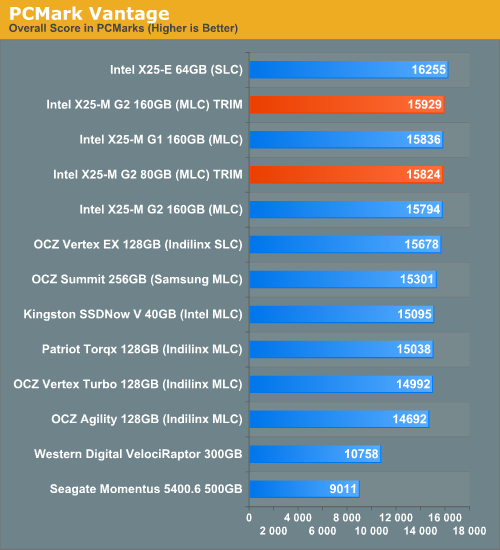
The overall impact of the TRIM firmware is negligable, no real improvements here - something you'll see echoed in nearly all of the PCMark results. The 40GB Kingston drive does well for its price, delivering performance similar to an Indilinx drive as it is crippled by a small amount of free space.
The memories suite includes a test involving importing pictures into Windows Photo Gallery and editing them, a fairly benign task that easily falls into the category of being very influenced by disk performance.
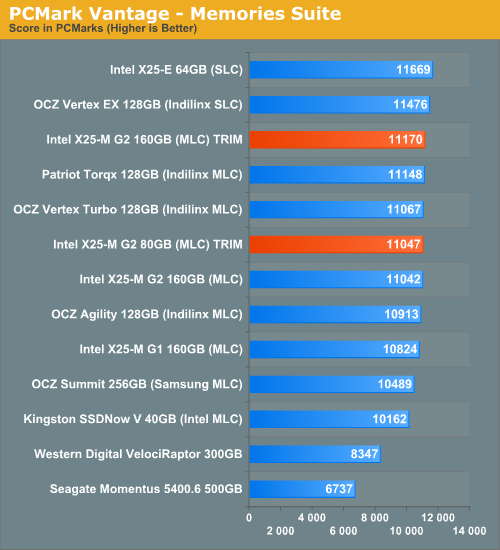
The TV and Movies tests focus on on video transcoding which is mostly CPU bound, but one of the tests involves Windows Media Center which tends to be disk bound.
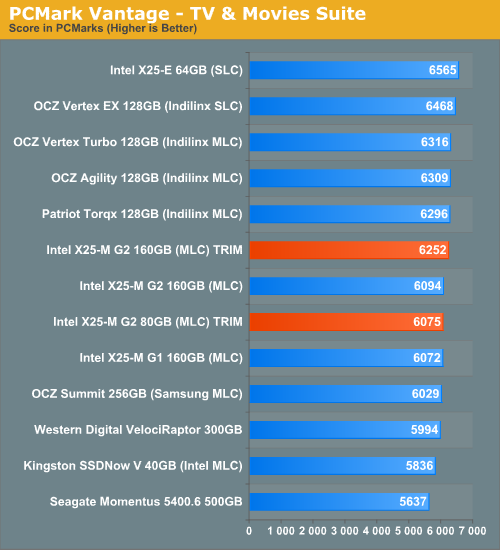
The gaming tests are very well suited to SSDs since they spend a good portion of their time focusing on reading textures and loading level data. All of the SSDs dominate here, but as you'll see later on in my gaming tests the benefits of an SSD really vary depending on the game. Take these results as a best case scenario of what can happen, not the norm.
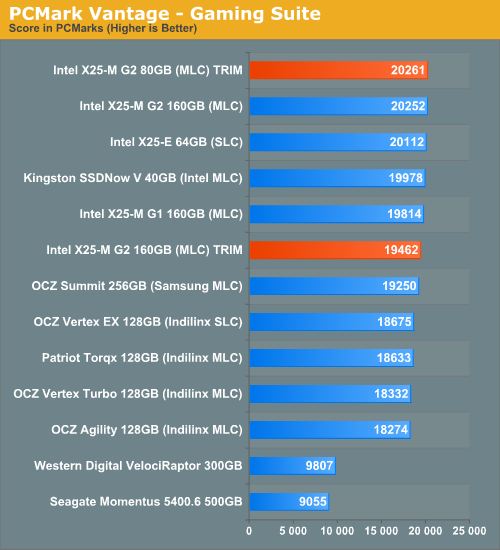
In the Music suite the main test is a multitasking scenario: the test simulates surfing the web in IE7, transcoding an audio file and adding music to Windows Media Player (the most disk intensive portion of the test).
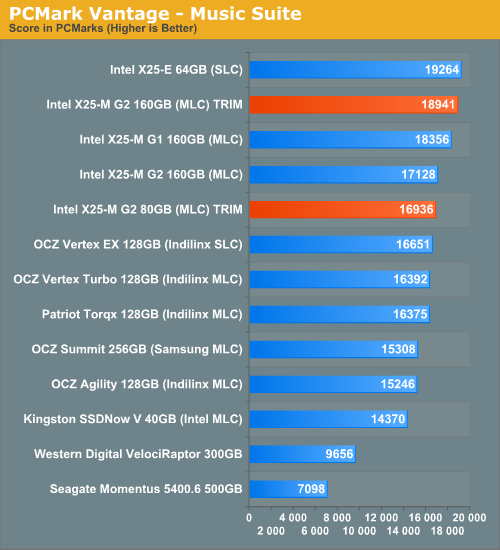
The Communications suite is made up of two tests, both involving light multitasking. The first test simulates data encryption/decryption while running message rules in Windows Mail. The second test simulates web surfing (including opening/closing tabs) in IE7, data decryption and running Windows Defender.
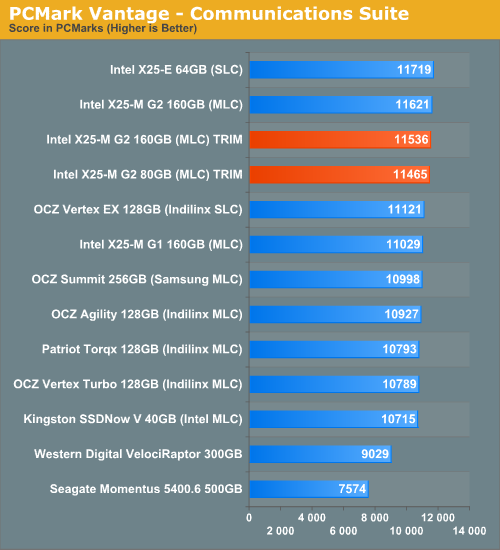
I love PCMark's Productivity test; in this test there are four tasks going on at once, searching through Windows contacts, searching through Windows Mail, browsing multiple webpages in IE7 and loading applications. This is as real world of a scenario as you get and it happens to be representative of one of the most frustrating HDD usage models - trying to do multiple things at once. There's nothing more annoying than trying to launch a simple application while you're doing other things in the background and have the load take forever.
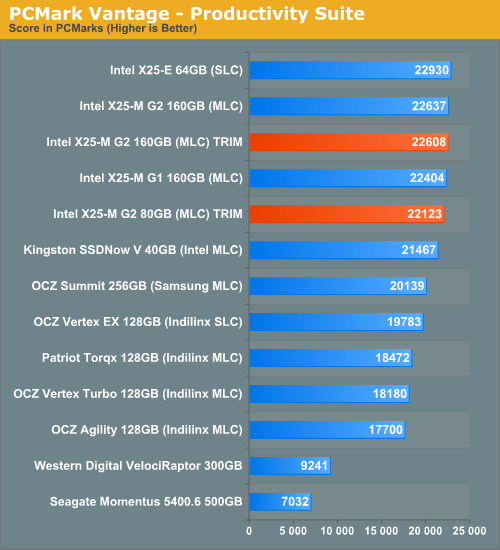
The final PCMark Vantage suite is HDD specific and this is where you'll see the biggest differences between the drives:
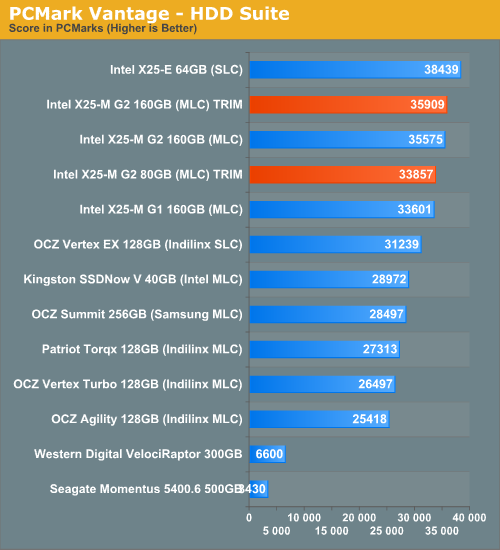










162 Comments
View All Comments
Voo - Tuesday, October 27, 2009 - link
Ok I was a bit surprised and tried it myself with my 160gb Intel G2 (no firmware update yet)Copy 10gb file onto drive, MSE full scan and extracting a 4gb file with 7z while the usual stuff (FF, PS, eclipse and winamp) running in the backgorund and I got a maximum QD of under 8, which is higher than I expected it to be, but still far away from a QD of 16.
And when doing more multitasking stuff I'd probably tax the rest of the system more than the SSD so at least for my usual behavior a QD >8 is unrealistic, but I see your point.
There are probably some people who could get a QD of 10-12 in a normal workload, so that could be interesting for them :)
GullLars - Wednesday, October 28, 2009 - link
There is a big difference between average queue and queue during operations. The IO queues are relatively low for all the background operation the OS does, and sequensial read/write, but when you do things like open administrative tools, open a program, or install something, you will se queue spikes of easily 50-60.After i commented this article i had a discussion with some other benchmarkers, and we found that normal use generates IO queue spikes almost whenever you interact with the OS. It doesn't take much effort to generate a queue above 100. Running a couple of virus scans on folders of small files while installing a program and opening a folder with lots of pictures will get you a massive queue.
NeBlackCat - Tuesday, October 27, 2009 - link
Nice work again Anand - I just don't bother reading SSD reviews/features on other sites any more.HOWEVER...
Many people reading this will be developers wondering which controller best favours typical development activities, eg. checking out and compiling large projects. It's a hard one to guess - lots of random reading, sequential reading, random writing (temp files) and sequential writing (output files).
So how about a "typical developer" benchmark of, say, compiling the Linux kernel while concurrently encoding some H.264, grepping all the sources for a string, and watching some por..er, I mean, youtube.
Has anyone else evaluated the best SSD type for s/w development?
clarkn0va - Wednesday, October 28, 2009 - link
Not a reply to your question, but I've taken on the habit of mounting my temp files to a ramdisk. Besides the speed improvement, this should help to reduce unnecessary write cycles to the SSD. Similarly, I run without swap (or page file), RAM being as affordable as it is.lamo - Tuesday, October 27, 2009 - link
TRIM support aside, I wonder how would a pair of $85 Kingston drives in a RAID 0 striped array compare against a $225 X-25M dollar/performance-wise.cosminliteanu - Monday, October 26, 2009 - link
So - "Your best bet is to install Windows 7 with your I/O controller in AHCI mode (for Intel chipsets)" this means you set in BIOS sata controller as AHCI not as IDE ?????Or just leave as IDE and after Win7 install, update intel storage driver as normal...? which is the best solution?
LuMax - Monday, October 26, 2009 - link
Can I use Intel IMSM RAID on just the data storage drives in my PC and retain TRIM functionality on the W7 Pro OS (X-25M G2) SSD?My new PC build plan was to use a single 80GB G2 for the OS and programs and two 2TB HDDs in a RAID1 array for my data/photo/video/music storage. Although I read the relevant part of this article 3 times I am still not certain if this is doable. Yes/No?
LuMax - Tuesday, October 27, 2009 - link
I heard back from Intel today:"Thank you for contacting Intel Technical Support.
I understand your question about the Intel(R) Matrix Storage Manager and the SSD. Since the drives you will be using in RAID are non-solid state disks, and the SSD you will be using will not be part of the RAID, there should not be any problem with TRIM."
somedude1234 - Tuesday, October 27, 2009 - link
I would not expect this to be possible. It sounds like you have 3 drives hanging off of the same SATA controller. You want 2 of them in RAID 1 using the IMSM driver, and one of them using the MS driver.In my experience it would be impossible to get Windows to load 2 different drivers for different ports on the same controller.
Even if they were physically independent but identical controllers (for example if you had 2 identical SAS cards plugged into the same system), as soon as you update the driver on one controller, a reboot results in all instances of that controller using the updated driver.
DoveOfTheSouth - Monday, October 26, 2009 - link
I'd like to know this too.I'm considering a similar set-up (SSD for systems drive, RAID for data storage HDD) - seems best of both worlds.